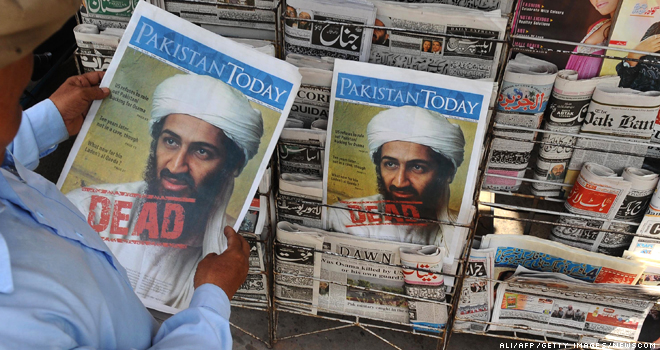A successful attack on Osama Bin Laden may mark a satisfying end to one chapter of America’s War on Terror, but the circumstances of the operation raise disturbing new questions about the nation’s already troubled relationship with Pakistan. On Monday, high-ranking lawmakers and officials openly aired their suspicions that forces within the crucial ally’s government deliberately withheld information on the terrorist leader’s location.
“They’ve got a lot of explaining to do,” Sen. Carl Levin (D-MI), chair of the Senate Armed Services Committee, told reporters Monday.
TPM SLIDESHOW: Osama Bin Laden: 9/11 Mastermind, Longtime U.S. Enemy Killed In Pakistan
Intelligence officials have long suspected that Pakistan’s weak and fractured government may be host to rogue elements either disinterested in catching — or actively sympathetic to — anti-Western terrorists. But the presence of Bin Laden’s heavily fortified compound in a garrison town near Islamabad magnified concerns that Al Qaeda had help from the inside in concealing its leader’s location.
“It’s very difficult for me to understand how this huge compound could be built in a city just an hour north of the capital of Pakistan in a city that contained military installations, including the Pakistani military academy, and that it did not arouse tremendous suspicion,” Sen. Susan Collins (R-ME), ranking member of the Homeland Security Committee, said at a press conference on Monday.
“It was not like a normal house in New Jersey, I can tell you that,” Sen. Frank Lautenberg (D-NJ), who has called for a new review of military and economic aid to Pakistan in light of the Bin Laden raid, told TPM.
Sen. Dianne Feinstein (D-CA), chair of the House Intelligence Committee, also told TPM that the operation raised red flags for her.
“I’ve had a growing concern that the Pakistani intelligence community is really walking both sides of the street and the question comes what to do about it,” she said. “At some point I think there has to be an understanding.”
Trying to get out ahead of the emerging attack on his government’s credibility, Pakistani President Asif Ali Zardari published an op-ed Tuesday in the Washington Post claiming credit for helping root out Bin Laden and noting that attacks by Islamic extremists had cost his country thousands of lives, including his late wife and former prime minister Benazir Bhutto.
In briefings with the media, U.S. defense officials sought to tamp down speculation as to whether Bin Laden was operating with aid from inside the Pakistani government.
“We have no indications that the Pakistanis were aware that Osama Bin Laden was at the compound in Abbottabad,” one senior official told reporters Monday.
But defense and intelligence officials indicated to reporters that the American military carried out a months-long casing of the compound and finally a complicated and dangerous raid all without ever informing their Pakistani counterparts of their interest in the target. “It should tell you a lot that we didn’t trust them to help us” take out bin Laden, one U.S. official was quoted as telling the Wall Street Journal. “You think about where he was living, and we didn’t want their help.”
“It is inconceivable that Bin Laden did not have a support system in that country,” John Brennan, chief counterterrorism advisor to the President, told reporters. “I’m not going to speculate on what type of support he had and what official basis.”
However imperfect the relationship may be, lawmakers and officials warn that there are major risks to cutting off or weakening ties with the Pakistani government. The country is considered a major source of intelligence and shares a long border with Afghanistan, making its cooperation valuable in combating anti-Western militants. Its nuclear arsenal also provides major incentive to stay engaged.
“The fact is they have a nuclear inventory. If those nuclear weapons fell into the wrong hands it could be a direct threat to United States national security,” Sen. John McCain (R-AZ) told TPM Monday evening. “We had nothing to do with them for a long time. That was not a productive enterprise.”
Sen. Joe Lieberman (I-CT), while also expressing concerns about whether Pakistani officials led the U.S. astray in its hunt for Bin Laden, told reporters on Monday that Pakistan still was still a key ally and that they faced intense pressures at home over their support.
“My own experience with Pakistanis is this is one of the most complicated, maybe the most complicated, security intelligence relationship we have with any country in the world,” he said.









